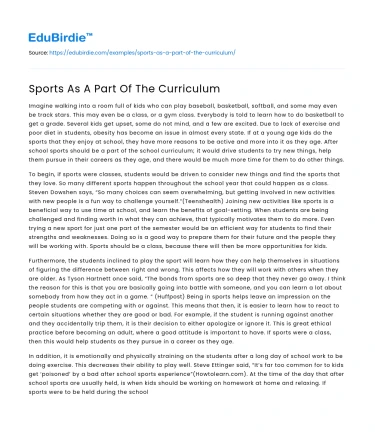Imagine walking into a room full of kids who can play baseball, basketball, softball, and some may even be track stars. This may even be a class, or a gym class. Everybody is told to learn how to do basketball to get a grade. Several kids get upset, some do not mind, and a few are excited. Due to lack of exercise and poor diet in students, obesity has become an issue in almost every state. If at a young age kids do the sports that they enjoy at school, they have more reasons to be active and more into it as they age. After school sports should be a part of the school curriculum; it would drive students to try new things, help them pursue in their careers as they age, and there would be much more time for them to do other things.
To begin, if sports were classes, students would be driven to consider new things and find the sports that they love. So many different sports happen throughout the school year that could happen as a class. Steven Dowshen says, “So many choices can seem overwhelming, but getting involved in new activities with new people is a fun way to challenge yourself.”(Teenshealth) Joining new activities like sports is a beneficial way to use time at school, and learn the benefits of goal-setting. When students are being challenged and finding worth in what they can achieve, that typically motivates them to do more. Even trying a new sport for just one part of the semester would be an efficient way for students to find their strengths and weaknesses. Doing so is a good way to prepare them for their future and the people they will be working with. Sports should be a class, because there will then be more opportunities for kids.
Save your time!
We can take care of your essay
- Proper editing and formatting
- Free revision, title page, and bibliography
- Flexible prices and money-back guarantee
Furthermore, the students inclined to play the sport will learn how they can help themselves in situations of figuring the difference between right and wrong. This affects how they will work with others when they are older. As Tyson Hartnett once said, “The bonds from sports are so deep that they never go away. I think the reason for this is that you are basically going into battle with someone, and you can learn a lot about somebody from how they act in a game. ” (Huffpost) Being in sports helps leave an impression on the people students are competing with or against. This means that then, it is easier to learn how to react to certain situations whether they are good or bad. For example, if the student is running against another and they accidentally trip them, it is their decision to either apologize or ignore it. This is great ethical practice before becoming an adult, where a good attitude is important to have. If sports were a class, then this would help students as they pursue in a career as they age.
In addition, it is emotionally and physically straining on the students after a long day of school work to be doing exercise. This decreases their ability to play well. Steve Ettinger said, “It’s far too common for to kids get ‘poisoned’ by a bad after school sports experience”(Howtolearn.com). At the time of the day that after school sports are usually held, is when kids should be working on homework at home and relaxing. If sports were to be held during the school day, then there would be much more after school time for work and there would be much more time for doing other things.
Sports should be a part of the curriculum. Kids would be much more motivated across the world to be more physically active. Every single day, some children across America are taking some form of physical education or after school sport that brings more negative effects than positive into their lives. Bringing sports into students’ school lives would drive students to try new things, help them pursue in their careers as they age, and there would be much more time for them to do other things.
References
- “Extracurricular Activities.” Edited by Steven Dowshen, KidsHealth, The Nemours Foundation, Mar. 2017, kidshealth.org/en/teens/involved-school.html.
- Hartnett, Tyson. “Why Sports Are So Valuable.” The Huffington Post, TheHuffingtonPost.com, 11 Mar. 2015, www.huffingtonpost.com/tyson-hartnett/why-sports-are-so-valuabl_1_b_6851878.html
- “After School Sports – Why Kids Say No.” How To Learn | Powerful Strategies to Master Any New Skill or Subject, 14 Dec. 2012, www.howtolearn.com/2011/07/after-school-sports-why-kids-say-no






 Stuck on your essay?
Stuck on your essay?

